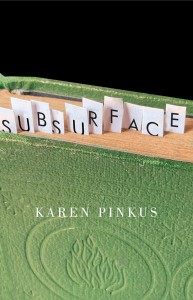ANOTHER BOOK ~ Proverbial Subsurface is Where to Find Lessons on the Climate Crisis
From an Article by David Nutt, Cornell Chronicle, April 21, 2023
In her new book, “Subsurface,” Karen Pinkus, professor of Romance studies and comparative literature in the College of Arts and Sciences, confronts the global threat of climate change by using select literary works from the 19th century to delve underneath comfortable narrative layers and complacent ecological modes.
The book, published April 2023 by University of Minnesota Press, explores key subsurface themes – cracks, extraction, burial, surface depth and subterranean futures – to find new narrative possibilities through the geology beneath us.
Question: So much environmental discussion revolves around the land, the ocean, the air. What inspired you to venture down underneath the Earth’s surface?
Answer: The book evolved over several years, but I would say that I was grappling with the geological column – a visual representation of deep time that “begins” at the bottom, contrary to the way we read a poem or any text. So already the column troubles normal cognitive patterns and it places us in a very strange relation with the planetary past. And then I was fascinated by the idea that humans (some of whom have burned fossil fuels at alarming rates) are located on the surface, which may soon officially be a new band of the geological column, the Anthropocene, to be placed above the Holocene. This opens up the possibility that we, too, will be covered over by later epochs, by other colored bands, assuming the beings who come after us decide to continue our current system of graphic representation.
Q: Why did you decide to focus on literature from the 19th century? What about the works from this era make them relevant now?
A: Short answer: this is the period of industrialization when fossil fuel emissions, through the combustion of coal and then oil, become intensified. There are also quite a few literary works set in the subsurface, not coincidentally. Longer answer: I am interested in how climate change fundamentally shifts how we read narratives. Elsewhere I’ve written about this issue through “The Odyssey,” to give just one example. To the degree that “Subsurface” suggests a method, it might work with any era.
Q: How does it feel to immerse yourself in literature from a period that was less ecologically damaged than our present? Does it make you more despairing about the current climate and geological situation, or does it inspire you?
A: I don’t take any solace in an escape to the past. On the contrary, I read works from the 19th century with the full acknowledgement that something fundamental has shifted. And it’s important to distinguish between “local” ecological damage (say, smog in industrial England or the pollution of a lake due to toxic runoff) and the truly global and unprecedented phenomenon of invisible greenhouse gases in the atmosphere, beyond human perception. Given this, to imagine the 19th century (or any time or place) as “unpolluted” and “purely natural” really seems to me like bad faith or a lack of imagination in the face of the climate crisis.
Q: Were there any specific contemporary books, or literary works from outside the 19th century, that might also help us understand the subsurface and humanity’s impact on it?
A: This is complicated. The descent into the underworld (followed by a return) is a key trope that you could trace from antiquity through futuristic science fiction; from narratives of despair or redemption to the recent Italian film, “Il Buco,” about cave exploration. I should clarify that I’m not claiming that humans have had an impact down there, although I do write about the burial of matters such as nuclear waste or even captured carbon dioxide. I’m much more interested in reading, today, with the subsurface as a method.
Q: In the book’s introduction, you ask your readers “to move between genres, periods and affects. …. Subsurface is a work of discord inasmuch as it projects the reader back (and then forward) in time.” What is the advantage of this approach?
A: To shake up our usual way of thinking, to get outside of a complacent ecological mode.
Q: What did you ultimately learn through your research?
A: Because the ways for humans to actually “descend” are limited, the subsurface has been a repository for all sorts of ideas and dreams. I learned a lot from reading and talking to scientists about how little they really know about the (deep) subsurface compared to say, the moon or Mars. That means there are potential resources there to be exploited or, to put a more positive spin on things, potential openings to new knowledge, new forms of life, new futures. Ultimately, though – and I hope this isn’t a spoiler – I don’t think of the subsurface as a space that will redeem us once we colonize it or, better, decolonize it. As I said, for me it’s a way of confronting climate change as something absolutely different from past crises or catastrophes.
